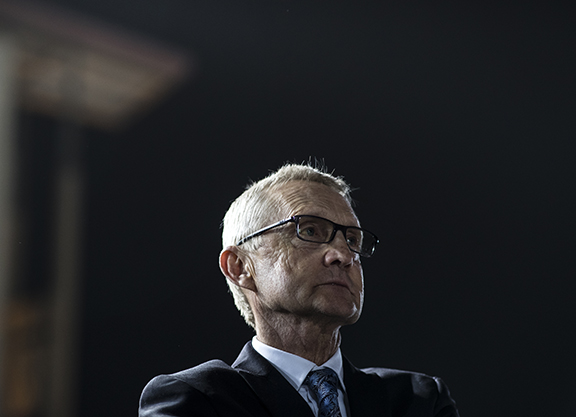By T. D. Thornton
The federal prosecutor leading the case against an alleged network of racehorse dopers underscored several times during a Nov. 17 court hearing that the government might not yet be done bringing new charges that could involve either existing or fresh defendants as it continues to investigate a purported years-long conspiracy to manufacture, mislabel, rebrand, distribute and administer performance-enhancing drugs (PEDs) to Thoroughbreds and Standardbreds across America and in international races.
“There may well be other crimes as to the particular defendants in this case,” United States Attorney Andrew Adams said in response to a direct question on that topic from U.S. District Judge Mary Kay Vyskocil. “And [the government] is continuing to look at other people who are not currently charged.”
During the Tuesday morning teleconference, 14 defendants pleaded “not guilty” to updated charges in US. District Court (Southern District of New York) stemming from a Nov. 5 superseding indictment that replaced an original indictment filed after a wave of arrests in March.
The headline Thoroughbred industry defendants in the case are the now-barred but formerly above-norm-win-percentage trainers Jason Servis and Jorge Navarro.
A dozen other alleged co-conspirators either appeared via phone or had pleas entered by their attorneys on Tuesday. They include drug manufacturers, distributors, stable employees, and veterinarians allegedly involved to various degrees in the five counts listed in the indictment. They are: Erica Garcia, Christopher Oakes, Michael Tannuzzo, Marcos Zulueta, Rebecca Linke, Kristian Rhein, Michael Kegley, Jr., Alexander Chan, Seth Fishman, Jordan Fishman, Lisa Giannelli, and Rick Dane, Jr.
In addition, five individuals named in the original March indictment were not included in the superseding indictment, which has led to speculation that they could be cooperating with law enforcement authorities to widen the case in exchange for having charges dropped. Two other defendants pleaded guilty in September.
On Tuesday Adams revealed that prosecutors now believe that at least two of the alleged conspirators–Chan and Rhein–were pushing some fake PEDs to Servis that didn't really enhance performance. But, the prosecutor added, the government will be treating those substances as if they were actual PEDs because Servis's true intent was to allegedly dope horses.
Adams explained that the recently added wire fraud charges alleged against those three defendants were brought to light by investigators who uncovered “a false billing scheme relating to certain drugs being administered by Dr. Rhein's veterinary practice, including to horses under the care and training of Mr. Servis.” He added that it amounts to false billing when “certain drugs were promoted or intended to be used as performance-enhancing drugs, regardless of the efficacy of those drugs.”
The prosecutor then elaborated: “That is, a drug that is promoted and intended to be a performance-enhancer but is, you know, a dud, is nevertheless [considered to be] a misbranded an adulterated drug for the purposes of this indictment…”
And because those allegedly false billing transactions purportedly were conducted via some form of phone, text, or email communications, they constitute wire fraud, the government is alleging.
When Judge Vyskocil asked Adams point-blank to name the victims who were allegedly defrauded via the five counts in the indictment, Adams did not hesitate to answer.
“Horse owners are among the primary or intended victims,” with regard to the wire fraud charges, Adams said.
“With respect to misbranding, the racetracks, racing commissions, owners [and other] competitors are all among people who were in the minds of the defendants charged with the misleading and deceit,” Adams added.
The news that more charges and/or yet another expanded time frame for the alleged crimes could be in the pipeline was not welcomed by defense attorneys, who have already lodged concerns about the massive volume of electronic evidence being introduced in the case and how an elongated discovery and pre-trial period is not in the best interest of their clients' right to a speedy trial.
“We do continue to investigate and continue to look into all aspects of the case,” Adams said when pressed by the judge for some sort of timeline on potential future charges. “The wire fraud that has come down now is largely the fruit of investigations that straddled the original indictments. It was built on information from both before and after. And I don't leave aside the possibility that that may happen again, with respect to other false billing practices.”
Servis's attorney, Rita Glavin, said she wanted a more definitive answer so she could make the best defense possible for her client without having to start all over if new charges got levied against him. She asked Adams, “Does the government, as we sit here today, think it's likely that there will be a superseding indictment in the next four to five months?”
Adams replied, “The government is not under an obligation to answer that question. And it frankly will not impact, in the government's view, any timelines set for Mr. Servis.”
Glavin countered: “Today is the first that I've heard from the government a whisper that there may be another superseding indictment. And I understand the government's representation that they don't believe it would impact Mr. Servis. But I would have to see that when I see it. I don't know what their current investigations are. But I certainly would be concerned about setting a schedule in the case if we're going to see new charges come out.”
Despite the open-ended nature of the ongoing investigation and the mounting reams of evidence it is generating, Vyskocil declined to set a deadline for discovery. The judge did, however, aim to set a timetable for future proceedings that allowed the defense proper time to sift through all the relevant materials during the discovery period and to potentially file motions based on what attorneys uncover.
So a Feb. 5 date has now been set for the first round of what the judge termed as “dispositive motions” that the defense could file to put an end to some or all of the charges against defendants. The prosecution would then have a month to reply (Mar. 5), and the defense would get three additional weeks to counter those replies (Mar. 26).
A second round of motions dealing only with defense requests to suppress evidence or expert testimony now has a May 24 target deadline, but a status hearing scheduled 10 days before then will determine if that is a realistic date.
Vyskocil said at this point, it would be “premature” to even consider a pre-trial schedule that extends beyond the time frame of next spring.
Not a subscriber? Click here to sign up for the daily PDF or alerts.






